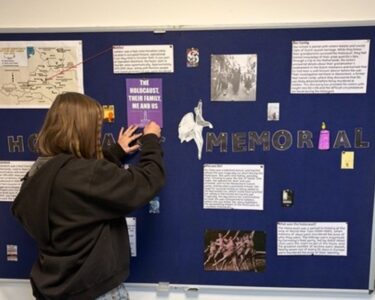Torpoint Community College is a semi-rural secondary school in South-East Cornwall and is a proud UCL Quality Mark Beacon School for Holocaust Education. Charlotte Lane is Lead Teacher for Holocaust Education at the college and is Head of History. She has been a teacher for 20 years in both the Creative Arts and History and is committed to providing opportunities for students to express their understanding of History in many different ways. Torpoint Community College’s Scheme of Learning, Unpacking the Holocaust’s overarching aim is to; encourage students to search for their own meaning of the Holocaust, by providing them with information and high-quality resources based on research.
- Blog 1: ‘It started with a shoe’
- Blog 2: Exploring antisemitism, spaces of killing and use of IT
- Blog 3: Being Human, creativity and exploring ‘the Void’
- Blog 4: Applying historical understanding to memorials and commemoration through assessment
In this four-part blog series, Charlotte kindly shares with us her professional and personal reflections upon her pilot scheme. It aims to develop an enquiry-based approach to History and improve independent thinking; study and develop interpretations of History; understand causality, inevitability and consequence; develop understanding of significant events and people; develop confidence in understanding chronology; identify continuity and change and the reasons for this; encounter a range of primary, secondary and contemporary source evidence; consider ethical dimensions; take on a historical perspective in a thoughtful and productive way; develop empathetic understanding; encourage deeper analysis and questioning of a confusing and chaotic period of history.
The Centre recognises the ambition and innovation in this scheme of work – not all schools can devote eighteen lessons to the Holocaust – but hope this scheme will highlight the complexity of developing schemes, bespoke to a particular school context. Charlotte is a reflective practitioner and the first to admit, her scheme remains a work in constant progress and refinement, and, like the Centre, that other alternative disciplinary approaches exist. She has kindly shared these insights to inform and inspire others, to consider the strengths and weaknesses of this approach, and, as a Centre, we hope it will spark courteous professional discussion and reflection upon other approaches to framing Holocaust teaching and learning.
Lesson 13 enabled me to explore with students the historical significance and contemporary relevance of the Holocaust today. I asked students, ‘How should the Holocaust be remembered?’ Students would be given the opportunity to analyse a memorial to ascertain an opinion, engage in a matching group activity and independently construct a balanced argument about memorialisation and commemoration in writing. This approach supported students developing historical skills in source analysis and refined their understanding of interpretation and representation.
There is no doubt, that Charlotte Lane created an innovative, historically rigorous and engaging scheme of work as a result of her engagement in the UCL Beacon School programme. It all ‘started with a shoe’ and has led to impressive student’s outcomes.
There is no single way to approach a Holocaust scheme of work – Torpoint Community College’s approach would not fit every school context, but was created with the needs of their students and their school context in mind.
The Centre would like to thank Charlotte Lane – Beacon School Lead Teacher – and all those involved in developing and delivering this scheme to students at the Quality Mark, Torpoint Community College, for their generous sharing of this scheme and their innovative and insightful reflective practice.



